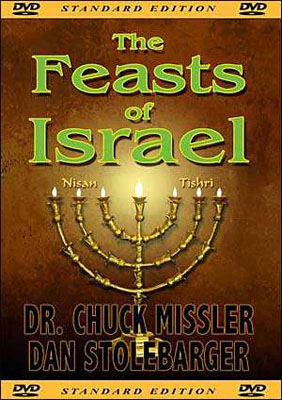On May 16-17 (the 6th of Sivan) Israel will celebrate Hag Ha Shavuot, the Feast of Weeks, or Pentecost.(May 1994)
This is based on Leviticus 23:15-22, which points to "the morrow after shabbat after Passover" (the Feast of First Fruits) plus 50 days--in Greek, Pentecost.
Pentecost is one of only three of the seven feasts of Moses which was compulsory for every able male to attend.1 This seems to indicate that these three were of particular significance.
The Feast of Weeks is associated with the birth of Israel and the giving of the Law in Exodus 19. Thus, it is also called the Feast of Revelation.
Since the Passover was on the 14th of Nisan, and there were three days to the Red Sea crossing, then 46 days into the wilderness, and three days of Moses' preparation, this is deemed to correspond to the 49 day interval between the Feast of First Fruits (17th of Nisan) and the 6th of Sivan.
There is also a tradition that David died on the 6th of Sivan.
Prophetic Implications
The seven Feasts of Moses are not only commemorative, they are also prophetic.2 The first three, in the month of Nisan, are predictive of the First Coming of Jesus. The last three, in the month of Tishri, are associated with His Second Coming. It is this one, in between, which is associated with the Church.3
The Birth of the Church
The Birth of the Church appears to be a fulfillment of the Feast of Pentecost, or Shavout. Jesus predicted it,4 and it was also fulfilled precisely on the Feast of Pentecost.5
(It is interesting to carefully compare Acts 2 with Exodus 19, both of which apparently occurred on the 6th of Sivan.)
It is also interesting that this is the only Feast of Moses in which leavened bread is allowed, which seems to give it a Gentile flavor! (Leaven is always a "type" of sin. Jesus and Paul both used it this way.6 It corrupts by puffing up.)
Most writers assume that the Feast of Pentecost was completely fulfilled in Acts 2. But maybe there's still more to come.
Enoch Traditions
It is interesting that there is a rabbinical tradition that Enoch was born on the 6th of Sivan. Enoch is an extremely interesting mystery in the Old Testament. (The first prophecy by a prophet in the Bible is a prophecy of the Second Coming of Jesus Christ,7 uttered by Enoch before the flood of Noah!)
Another tradition about Enoch is that he was translated ("raptured?") on his birthday, the 6th of Sivan.
There were three groups of people facing the judgement of the flood of Noah:
- those that perished in the flood;
- those that were preserved through the flood (in the Ark);
- those that were removed prior to the judgement of the flood.
It is interesting that Enoch might be a foreshadowing of a removal prior to judgement, in contrast to Noah and his family who were protected through it.
The Trumpet of God
Paul mentions the "Trumpet of God" in connection with the rapture.8 It is interesting that this term appears only twice in the Bible: at the giving of the Law at Sinai9 and at the rapture.
(Don't confuse the "Trumpet of God" with the temple trumpets or the shofar. Also, remember that these trumpets continue during the Millennium, so they aren't "the last trump.")
Could both of these references to the "Trumpet of God" be connected with the 6th of Sivan?
The Feast of Harvest
Another name for the Feast of Weeks is Hag Ha Kazir, The Feast of Harvest, since it is celebrated at the time of the "first harvest." It is interesting that Jesus frequently used "the harvest" as an idiom to refer to the ingathering of believers.10
An Interval in God's Plan for Israel
In the famed Seventy Week prophecy in Daniel 9, where the Angel Gabriel outlines God's plan for Israel, we find four key verses:
- 9:24 the scope of the prophecy;
- 9:25 69 weeks (of years)climaxing in the presentation of the Messiah the King;
- 9:26 an interval before the 70th week;
- 9:27 the 70th week.
(See The Seventy Weeks of Daniel for a review of this most amazing passage in the Bible.)
It appears that the sequence of events regarding Israel directly is interrupted for a period of time. This interruption appears to be associated with Israel's rejection of the Messiah11 and God's program for Israel is resumed at the completion of the Church.12
Paul tells us that the Church is a mystery not revealed in the Old Testament13 and if we examine the scriptures carefully we can find this mysterious interval throughout the scriptures.14
The day is approaching when the Church is "complete" and God will remove it and again continue with His program with Israel. Is it possible that His "clock" will restart on the 6th of Sivan, the very day that it was halted?
Caveat
While these conjectures are fun to explore, let's remember they are always just conjectures. We don't believe in setting dates: expect Him at any moment. "For in such an hour as ye think not the Son of Man commeth."
The Master Counter
Paul tells us that there will be a time coming when the "fullness of the Gentiles" will be complete.15 There is apparently a heavenly tally counter that is yet to be full or complete. It seems that every time someone trusts the Lord Jesus for their salvation, that counter is incremented by one. Someday, when it is finally complete, the Father will say to the Son, "Go get them!" But only He knows the completing number; no one else does.16
Satan also knows of this counter but not the final number when it will be complete. Every time someone comes to Jesus, Satan doesn't know whether or not the counter is finally full! When it is, and the rapture occurs, he knows that he has but a little time to unfold his final schemes.
(Do you realize that for almost 2,000 years, Satan has been in shock treatment? We can understand why he is so anxious for each of us to be unfruitful: he will do anything to slow that counter down!)
Our Opportunity
Every day that the Lord tarries is another day for us to do His work, to share His blessings, and to pray for our unsaved loved ones.
Have you taken the imminent return of the Lord Jesus seriously? Are you personally really ready? Is this just a conceptual acknowledgement or is it the active dynamic in your personal life? How about in your professional life? Or your family life?
Isn't it time to take the Bible seriously? Isn't it time to take Him seriously?
Are you one of the ones remaining to complete the counter -- and holding all the rest of us up?
For Further Study
A study of the Feast of Pentecost is not complete without a review of the Book of Ruth. The Jewish observance of the Feast of Weeks has always included the reading of this particular book. Why? It is provocative to note the interesting parallels relating to the Church.
This elegant love story exemplifies the role of the goel, or kinsman-redeemer. As we examine Boaz's role, we notice that he, in many ways, pre-figures our own kinsman-redeemer, Jesus Christ.
Through his act of redemption, Boaz returns Naomi (Israel) to her land, and also takes Ruth (a Gentile) as his wife. This suggests a parallel with the Church as the Gentile bride of the kinsman-redeemer.
The parallels between Boaz, Naomi, and Ruth with Christ, Israel, and the Church, have been widely recognized, but it is remarkable to notice how any additional details of the story are consistent with this viewpoint. For example, who first introduces Boaz to Ruth? An unnamed servant! (John 16:13)
(For further details, see The Romance of Redemption. One cannot fully appreciate Revelation Chapter 5 without it.
Notes:
- Deuteronomy 16:16.
- Colosians 2:16-17.6.
- See The Feasts of Israel.
- John 14:25-26
- Acts 2:1-47
- Matthew 16:6; Luke 13:21; 1 Corinthians 5:6-8; Galations 5:7-9
- Jude 14-15
- 1 Thessalonians 4:16
- Exodus 19:13; 16 et al.
- Matthew 12:29-30; 3:12; 2 Thessalonians 2:1
- Luke 19:42
- Romans 11:25
- Ephesians 3:3-7
- Luke 4:18-19 vs. Isaiah 61:1-2 (note omission); Revelation 12:5-6 et al.
- Romans 11:25
- Mark 13:32








